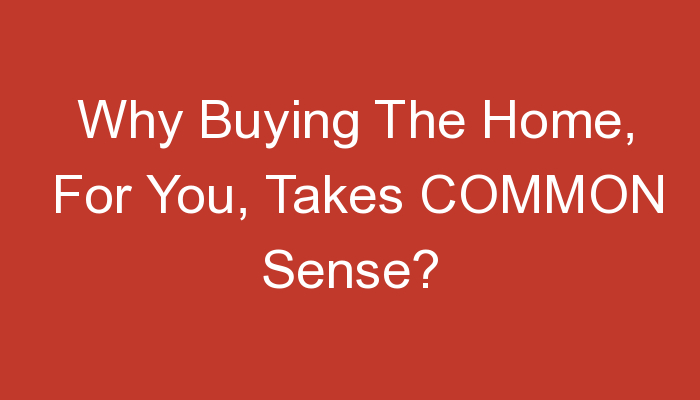Buying a home is an important decision, and it should be approached with COMMON sense. Here are five reasons why buying a home is the sensible choice for you. 1. You’ll Likely Save Money in the Long Run Buying a home isn’t just about getting into a property; it’s about locking in a low-cost rate for years to come.
Buying a Home is an Investment
There’s no getting around it: buying a home is an investment. When you buy a home, you’re locking in your place in the market and getting a piece of real estate that can provide security and growth over time. But it’s important to remember that investing in a home isn’t all about making money; it’s also about creating stability and creating memories. Here’s why:
1) Home ownership equals stability. When you own your home, you know where you stand financially – no matter what happens with the market. This peace of mind can be priceless when times are tough, and it can help build your confidence as an individual and as part of a family.
2) Home ownership gives you control. If you want to make some changes to your home – like adding a new bedroom or fixing up the roof – owning your own place makes it much easier than if you rented or lived with someone else. And since homeownership is such an important social construct, having some degree of control over your surroundings can feel really good!
The Dangers of Buying a Home Without Doing Your Research
Do you feel like buying a home is your destiny? Perhaps it’s time to rethink that perspective. What if you don’t have enough money for a down payment, or the right credit score? According to real estate website Trulia, more than half of all home purchases in America are made without doing your research first. The consequences can be costly and frustrating.
If you’re thinking about buying a home without doing your research, here are five reasons why it’s not a smart idea:
1. You may not be able to afford the mortgage.
If you don’t have enough money saved up for a down payment, you might not be able to buy a home even if you have good credit. In many cases, you’ll need at least 5% down, which can cost between $8,000 and $20,000 on average. That’s not including other costs like mortgage insurance, closing costs, and potential interest rates that could increase over time.
2. You could end up with an expensive home that you can’t afford to maintain or upgrade.
If you don’t do your research and buy a home that’s too expensive for your budget, it will soon become clear that maintaining it is going to be expensive too – especially if the market takes a downturn and prices go down faster than you anticipated.
The Pros and Cons of Owning a Home
The Pros and Cons of Owning a Home
There are many pros to owning your own home, but there are also some cons to consider. Here are the top pros and cons of owning your own home:
CONSIDER THE COSTS OF MAINTENANCE AND REPAIRS
One major downside to owning a home is that it requires ongoing maintenance and repairs. This includes things like cleaning, fixing broken locks, maintaining landscaping and checking for pests. If you’re not prepared to handle these tasks yourself, then it might be worth considering whether buying a home is the right decision for you.
MAKE SURE KEEPING A HOME IN GOOD CONDITION IS WORTH IT
Another downside to owning a home is that it can be expensive to keep it in good condition. This includes things like roofing repairs, window installation, painting and fixing leaks. There are also taxes and insurance costs associated with maintaining a property. It’s important to weigh the costs of keeping a home against its benefits before making a decision.
IT CAN BE COMPLICATED TO SELL A HOME
Owning your own home can be great if you have the time and money for renovations or upgrades, but selling a home can be tricky. First of all, homes usually sell faster when they’re on the market for shorter periods of time rather than over an extended period of time. Secondly, houses that have been well-m
How to Calculate Your Affordability for Owning a Home
When you’re ready to buy a home, the key is to calculate your affordability. This means understanding what you can afford and balancing your needs with those of the market.
There are a few factors that you need to consider when calculating your affordability, including:
-Your monthly mortgage payments
-Your down payment
-The amount of debt you currently have
-Your current wage
Conclusion
Buying a home is a serious investment, and one that should not be taken lightly. When you are ready to make the jump, remember that it is important to do your research so that you can make an informed decision. Be sure to consult with an expert before making any decisions – they will be able to help you understand the market, trends and what might be best for your unique situation. Finally, take into account things like affordability, location and climate – all of which will play a role in your final decision.

